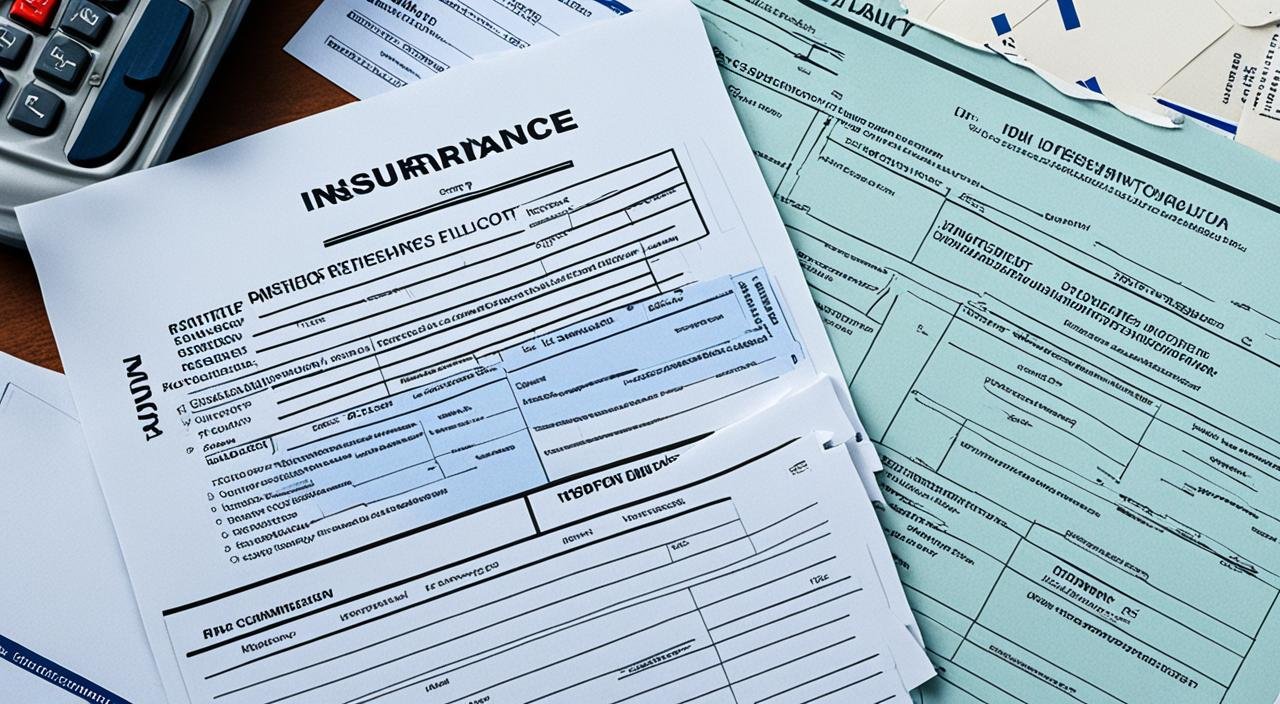Driving always has risks, like getting into an accident. Whether it’s a small bump or something more serious, it’s smart to know what to do. This guide will walk you through the steps for smoothly filing a car insurance claim. You’ll learn what to do right after an accident, what info and documents to collect, and how the claim process works.
You’ll also find out how to check your car’s damage, your settlement options, and how to handle any claim hiccups.
Key Takeaways
- Understanding the necessary documents required to file a car insurance claim can help streamline the process and ensure a successful outcome.
- Gathering information and evidence, such as a police report and witness contact details, is crucial immediately following an accident.
- Providing your insurance company with a completed claim form, repair estimates, and other relevant documentation can expedite the claims process.
- Familiarizing yourself with the claims process, including settlement options and the role of the insurance adjuster, can help you navigate any potential disputes or issues.
- Keeping open communication with your insurance company and following up on the status of your claim can help ensure a timely resolution.
Introduction
It’s key to know your car insurance policy well. It’s a legal contract setting out what’s covered and what’s not. By learning your policy, you’ll be ready to deal with accidents the right way.
Importance of Understanding Car Insurance Policy
When you buy car insurance, read it carefully. Make sure you understand what’s covered and not. The policy’s declaration page has most of this important info. Knowing your policy helps you make smart choices about your coverage and costs.
Overview of the Claims Process
If you’re in an accident, knowing the claims process helps. Here’s how it usually goes:
- Call your insurance right after the accident.
- Take photos and get witness info.
- Fill out a claim form and add documents like the police report.
- Let the insurance adjuster look at damages and agree on a payment.
- Fix your car at a shop or one the insurance suggests.
- Get your payment either all at once or straight to the shop.
Also Read: What Is Flood Insurance And What Does It Cover?
Steps to Take Immediately After an Accident
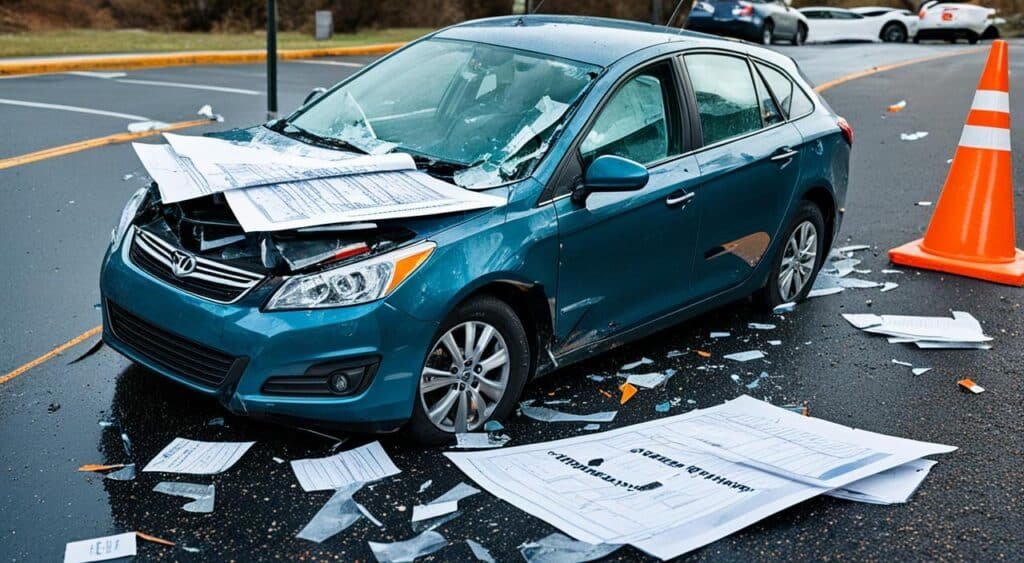
Right after an accident happens, it’s key to act fast and smart. This helps protect you and get what you need for your car insurance claim. The things you do right after can really change the outcome of your claim. We’re going to talk about the main steps to take after a car accident.
Securing the Scene and Calling Authorities
If it’s safe, the first thing to do is move your car to somewhere safe. This could be on the side of the road or in a parking lot. Turn on your hazard lights to warn others and avoid more accidents. Then, call the police because most insurance companies need to know about the accident soon, especially if someone leaves the scene.
Gathering Evidence and Witness Information
Next, start to collect info and evidence to help with your car insurance claim. Write down everything, like the names, addresses, and phone numbers of everyone involved. Also include witnesses. Take photos of your car and the accident scene. Try to get as much proof as you can with pictures.
- Obtain the other driver’s insurance information, including their policy number and the name of their insurance company.
- Document the make, model, and license plate number of the other vehicle(s) involved.
- Gather the contact information of any witnesses who may have seen the accident occur.
By taking these key steps after an accident, you make sure you have what you need to make a good car insurance claim. This helps protect your rights after the accident.
Also Read: What Are The Benefits Of Having A Life Insurance Policy?
Notifying Your Insurance Company

After a car accident, one of the first things you should do is notify your insurance company. This step is key to getting your claim handled quickly, no matter who’s at fault. You can reach your insurer by phone using the number on your card. Or start a claim online using their website or app.
Getting in touch with your insurer fast is crucial for several reasons. It lets them start gathering info, check the damage, and get the claim going. This speeds up handling your claim and makes sure you get the coverage your policy promises.
When filing an insurance claim, have these details ready:
- The date, time, and place where the accident happened
- A detailed explanation of what occurred and the damage to your car
- Contact info for any drivers or witnesses
- Your policy number and other relevant insurance details
By telling your insurance about the accident soon, you can make the claim process smoother. This might get your car fixed and back on the road more quickly.
Also Read: The Role Of Technology In University Campus Safety
Keep in mind, telling and filing with your insurer is super important. Doing this quickly can help you get the help and coverage you need. It also makes the claims process easier for you.
Information and Documents Required
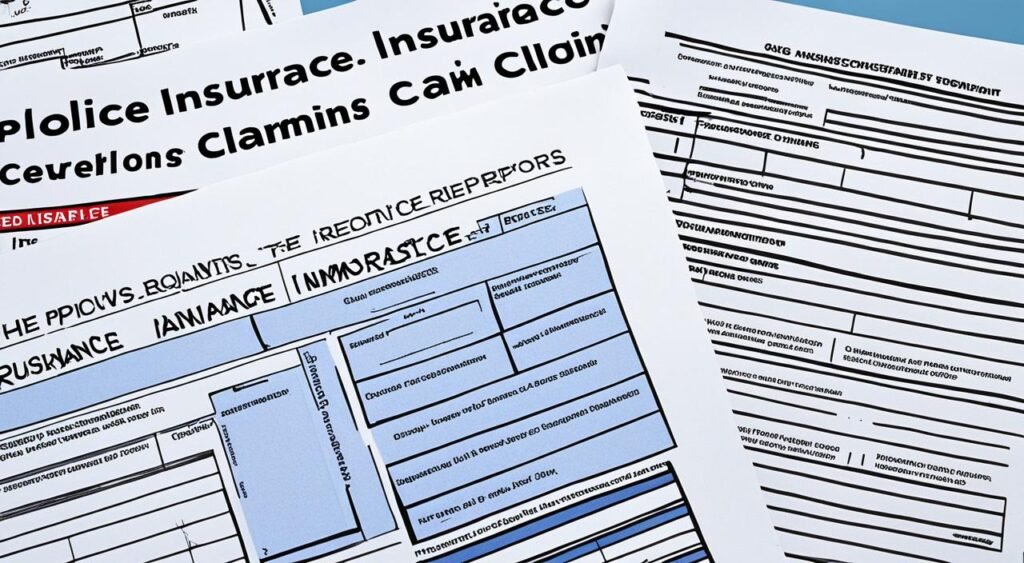
To file a car insurance claim, you’ll need to share some vital info and paperwork with your insurer. This is key for a smooth claims process. The main documents include a filled proof of claim form, a police report copy, and the info of any witnesses to the accident.
Proof of Claim Form
The proof of claim form is oh-so important. It tells your insurer about the accident’s date, time, and place. You must note the vehicles’ details and explain the damages. Filling this form out neatly and correctly will speed up your claim’s review.
Police Report
Getting a hold of the police report is a big deal in the claiming process. It’s an official record of the accident. It includes the incident’s specifics, any issued citations, and the cops’ notes. Your insurer will check this to confirm the accident details.
Also Read: What Types Of Athletic Programs Do Universities Offer?
Witness Contact Information
Don’t forget about any accident witnesses. Their info could be golden for your claim. Hand over any names and contact details of those who saw what happened. It can help back up your story and add proof to your claim.
Collecting these documents is essential. It ensures your claim moves along well and that you get fair coverage under your policy.
“Providing the necessary documents promptly can help streamline the claims process and ensure your claim is processed efficiently.”
car insurance claim
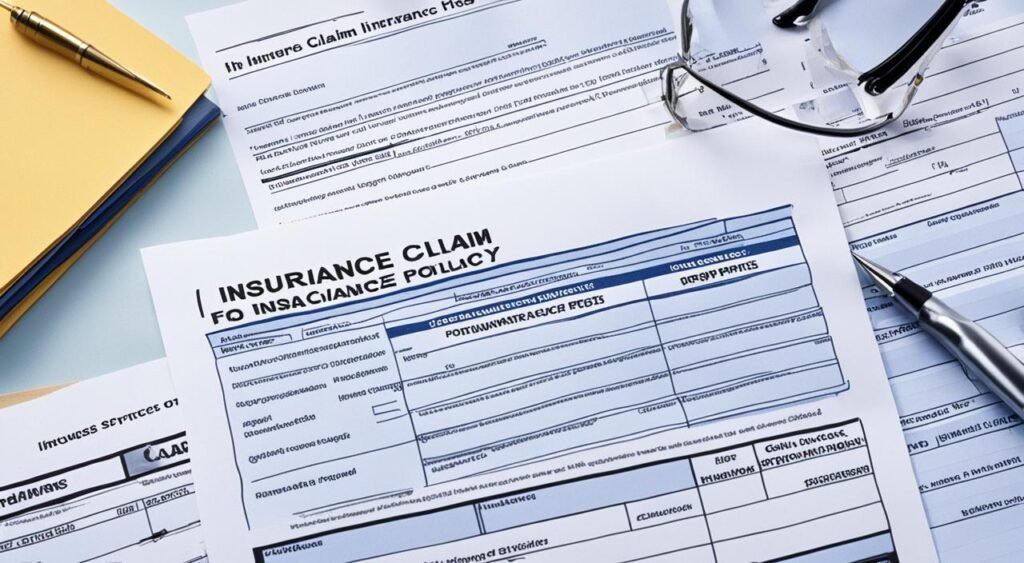
Filing a car insurance claim may seem hard, but knowing what to do can make it easier. Your insurance company will send a claims adjuster to look at the accident. They will check how much the damage costs.
The adjuster might ask for more info or need certain documents from you. They could also want to see your car or get estimates for fixing it. It’s key to work with them and give all they need. This helps your car insurance claim move along smoothly.
Also Read: What Is Risk Management In The Context Of Insurance?
Gathering Necessary Documents
When making your car insurance claim, you should have some documents ready. These can include:
- Proof of Claim Form: This form from your insurer has the details of the accident and your claim.
- Police Report: You usually need a police report from the accident to back up your claim.
- Witness Contact Information: If anyone saw the accident, their contact info is important.
Handing these in fast to your insurer can speed up your car insurance claim. It can also make for a quicker resolution.
Communicating with the Claims Adjuster
After starting your car insurance claim, the adjuster will get in touch a lot. You may have to explain the accident or give more documents. It’s important to work closely with them on figuring out the damage payment.
It’s good to keep talking openly with the adjuster. This makes sure your car insurance claim gets taken care of well and meets your needs.
“Filing a claim might sound tough, but the right info and prep can make it smooth and worry-free.”
Evaluating Vehicle Damage
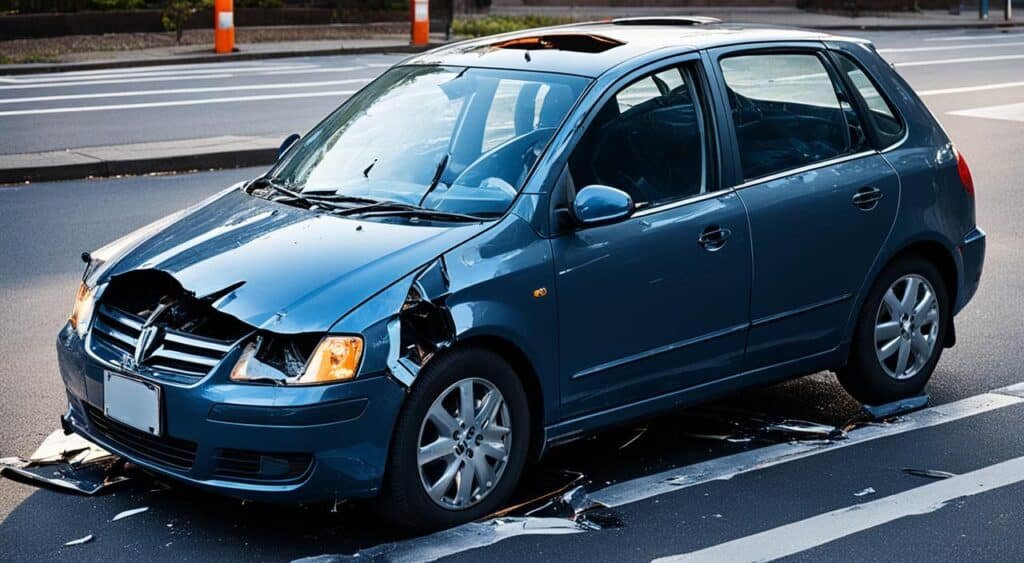
When you file a car insurance claim, checking the vehicle’s damage is crucial. A qualified adjuster or appraiser will inspect the car. They look over the damage and estimate the repair costs.
Adjuster or Appraiser Inspection
The insurance company will send someone to look at the car. This person can be an adjuster or an appraiser. They check how bad the damage is and decide what to do. The inspector takes notes and pictures. Then, they send a detailed repair cost to the insurance company.
Repair Estimates
After inspecting the car, the adjuster or appraiser gives a repair estimate. This estimate covers the costs of parts, work, and any other repair needs. If they find more damage later, the repair shop has to get okayed for these extra costs from the insurance company.
Knowing the evaluating vehicle damage process and working closely with the insurance company can help. It aims to make sure your car gets fixed right and you’re properly paid for repairs.
“The key to a smooth claims process is to actively participate and communicate with your insurance provider throughout the evaluation and repair stages.”
| Service | Description | Average Cost |
|---|---|---|
| Adjuster Inspection | Comprehensive assessment of vehicle damage by a qualified adjuster | No out-of-pocket cost |
| Repair Estimates | Detailed breakdown of the cost to repair the vehicle | Varies based on extent of damage |
Settlement Options
When you file a car insurance claim, the company usually pays to fix the car or its actual cash value (ACV). The ACV is the car’s worth in the market, considering age, use, and condition.
Your car insurance might let you and the company get an independent appraisal. This option is key if you don’t think their offer reflects your car’s true value.
Actual Cash Value (ACV)
The ACV shows what your car is worth now. It’s used if a car is totally lost or fixing it costs more than its value.
Insurance firms look at guides, online info, and local car prices to find the ACV. Knowing this could help when you’re not happy with first offers.
Appraisal Provision
- If you and the insurance company can’t agree, the car insurance might let you ask for an independent appraisal.
- This means you can hire an expert appraiser to value your car.
- Using the appraisal provision can help make sure you get a fair deal.
Learning about settlement options, actual cash value, and appraisal provision can help with your insurance claim. It ensures you get the right pay for your car’s damages or loss.
Additional Coverages and Benefits
When you file a car insurance claim, it’s key to know your policy well. Your insurance might include additional coverages and benefits. These can really help you when you’re processing a claim.
Rental car coverage is a vital thing to think about. It helps pay for a rental car if your car is under repair. This way, you’re not left without a way to get around. That’s very useful if your car can’t be driven safely.
Gap insurance is also crucial. It covers the difference between your car’s value and what you still owe. This could be a big help if your car is totaled. It means you won’t have a huge debt to pay off.
Knowing about all the insurance benefits makes your policy even more useful. Extra coverages can lower the cost of an accident. They make claims go more smoothly.
“Knowing the details of your car insurance policy can make all the difference when it comes to filing a successful claim.”
Examining your policy for things like rental car or gap insurance is crucial. It helps you understand what help is available. And it makes managing a claim easier in tough times.
Also Read: What Is Auto Insurance And Why Do I Need It?
Navigating the Claims Process
The process of making a claim on your car insurance can seem complicated. But, staying in touch with the claims adjuster and knowing your rights can make things go smoothly. Make sure you talk to the adjuster clearly and work to solve any arguments that come up.
Communication with the Adjuster
When you make a claim, you’ll talk a lot with a claims adjuster from your insurance. They might ask for a statement or a medical check from their own doctor. But, you don’t have to do what they ask. Try to be open and honest with the adjuster. Give them all the info and proof they need for your claim.
Resolving Disputes
If you hit a bump and have problems during the claim, you have some choices to fix it. First, talk your issues over with the adjuster and try to agree on a solution. If that doesn’t work, you can get your state’s insurance board involved. They’ll help manage the problem and look out for your rights.
Dealing with a car insurance claim can be hard, but good communication with the adjuster can really help. Make sure you understand how to work out any problems. This will give you a better chance of a good end result.
| Key Steps in Navigating the Claims Process | Description |
|---|---|
| Communicate with the Adjuster | Be cooperative and transparent in providing information and documentation to support your claim. |
| Understand Your Rights | Know that you are not obligated to provide a recorded statement or undergo an independent medical examination unless necessary. |
| Resolve Disputes | If issues arise, communicate with the adjuster and, if needed, contact your state’s insurance department for assistance. |
Conclusion
Filing a car insurance claim becomes easy when you know the steps and prepare the right documents. First, let your insurance company know as soon as you can. Then, make sure to collect all needed info. Always keep talking with the claims adjuster to speed things up.
Understanding your car insurance claim policy is crucial. Knowing how the claims process works is also key. Act fast right after any accident. These tips can really help you manage the conclusion of your claim. You’ll then properly get the benefits you deserve as a policyholder.
Stick to these guidelines to make the car insurance claim process smoother. Doing this cuts down on the stress and guesswork. Your insurance provider is on your side. By teaming up, you can reach a good resolution. Then, you can move on with confidence.
FAQs
Q: What documents are needed to file a car insurance claim?
A: To file an auto insurance claim, you will typically need your insurance policy information, details of the incident, photos of the damage, a copy of the police report (if applicable), and any relevant medical records for injury claims.
Q: How long do I have to file a car insurance claim?
A: It is recommended to file your claim as soon as possible after the incident. Many insurance companies have a time limit of around 30 days to file a claim.
Q: What should I do if my car insurance claim is denied?
A: If your claim is denied, you can appeal the decision with your insurance company. You may also seek assistance from the Department of Insurance in your state.
Q: What steps should I take to file an auto insurance claim?
A: If you need to file an auto insurance claim, contact your insurance company or insurance agent immediately after the incident. They will guide you through the process and help you understand what documents are required.
Q: Can I file an insurance claim for property damage and injury claims?
A: Yes, you can file a claim with your insurance company for both property damage and injury claims resulting from an auto accident. The process may vary depending on the nature of the claim.
Q: What should I do if I am involved in an accident with another driver?
A: If you are involved in an accident with another driver, exchange insurance information with them and report the incident to both your insurance company and the other driver’s insurance company regardless of fault.
Q: How does the deductible work when filing a car insurance claim?
A: When you file a claim, you may need to pay a deductible before your insurance company covers the rest of the claim. The amount of the deductible is typically specified in your insurance policy.
Source Links
- https://www.shouselaw.com/ca/personal-injury/car-insurance/how-to-file-a-claim/
- https://www.iii.org/article/how-do-i-file-claim
- https://www.insurance.ca.gov/01-consumers/105-type/95-guides/01-auto/hadaccident.cfm
